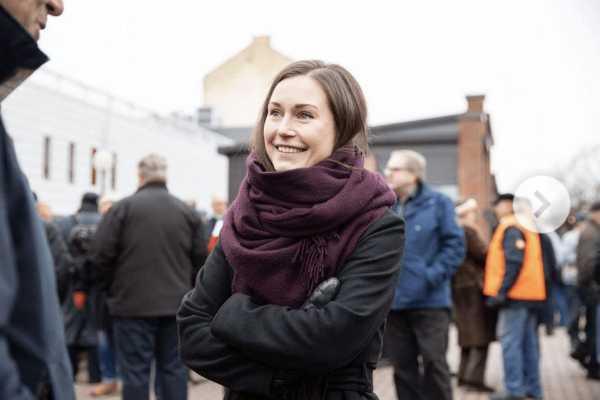Finland: Government Fights Unemployment Through More Support And Services For The Unemployed
In
Finland, the new Social Democratic government under Prime
Minister Sanna Marin is focusing on work-life balance,
investment in education and social partnership. It is also
learning from its experiment with universal basic income. We
spoke to Jenni Karjalainen, Special Advisor to the Minister
of Employment, to find out more about the plans of this
Finnish government. Kontrast: In recent years,
Finland has been suffering under a conservative political
agenda with austerity programs, dismantlement of the welfare
state, weakening the unions and cutting unemployment
benefits. Last year, the social democratic party won back
the Prime Ministership and is now heading a progressive
government. Could you describe the situation in
Finland? Karjalainen: Of
course, we are very glad that the citizens gave us their
trust and we won the last election. However, this doesn't
mean that everything is rosy right now. Although the Social
Democrats won the prime ministership, we are leading a five
party coalition, comprised of The Left Alliance, the Green
League, the Swedish People’s Party and the Centre Party
alongside us. The Centre Party is the party of the previous
Prime Minister, and for them it was not so easy to shift to
this new government. Currently, our biggest challenge
is raising the level of employment to 75%. This is a key
element of our government programme, and involves getting
60,000 people out of unemployment. Half of this number
should be achieved by next autumn. Therefore, the government
needs to put new legislation on the table to achieve this
goal. It is not going to be easy, especially given the fact
that the economists at the Ministry are emphasising cuts to
social security and work protections as a way to improve
employment levels. For us, these measures are of course the
last option. First, we want to improve the public employment
services and increase the cooperation between
municipalities, public employment services and private
companies, so that everyone searching for a new job will
receive the services and the support they personally need.
This is especially important for people who have
difficulties in the labour market, such as senior citizens
or people living with a
disability. Kontrast:
Finland’s work-life balance seems much better than in
other European countries. Nevertheless, your government is
discussing further improvement. What are the main challenges
in this field? Karjalainen:
The Nordic work-life balance model seems to be both very
effective and at the same time very resilient. One important
feature of it is the high level of gender equality. Both men
and women go to work and share family and household chores,
although fathers still use parental leave way less than
women do. Gender equality is something that helps a lot in
reaching work-life balance. During the previous government,
the working time legislation was reformed together with our
social partners and now there will be increased flexibility
in working time arrangements, which will also improve
work-life balance. One area where we are striving for
improvements is the quality of work. Quality of work can
always be improved and this is linked with productivity as
well - there are countless studies proving that people who
enjoy their work and are committed to it are more creative
and more innovative. As a result, productivity increases. Of
course, it is difficult to quantify the links between
quality of work and productivity. For this government,
improvements in quality of work are very important.
Therefore, we have a project on wellbeing at workplace that
we are about to start together with our social
partners. The aim is to get all the sectoral social
partners from the service and industrial sector into this
programme. Kontrast: Finland is a major
European tech hub. How can politics help to build an
environment for innovation and
creativity? Karjalainen: Our
party strongly believes that that our greatest asset is the
Finnish society. We have a functional social system
encompassing social security, education and work - to name
just a few. In addition, gender equality is central, as
already mentioned. Moreover, Finnish nature is of course a
major asset. These are our core assets and we have to take
good care of them. Necessary for this and our economic and
technological advancement is having a stable society and
economy, and an efficient and trustworthy civil
service. One
area where we are facing some challenges are immigration
processes. Like everybody else, we are trying to attract
global talent to Finland. To facilitate this, we moved the
work based immigration legislation from the Ministry of
Interior to the Ministry of Employment and Economic Affairs.
Now we are trying to create stronger links between economic
activity, innovation policies and employment policies.
Immigration policy will be more closely linked to these
policy areas. And of course, we are trying to integrate
everybody who comes here from abroad into our society and
facilitate them staying here in Finland. Then there
are of course different research and innovation funding that
are available for small and medium enterprises. However, the
most important thing might be the quality of the education
system. We need to have thriving universities that are
attractive enough for global super talents. We have noticed
that we still have some problems when it comes to the
attitude of employers towards the diversity of their
employees. Here in the Northern corner of Europe, not all
employers even consider hiring someone outside the 'typical'
candidate pool. As I already mentioned, senior citizens are
also affected by this attitude. We are beginning a campaign
on this issue in order to help employers realise that
diversity in the workplace is a key way to boost innovation
and productivity. When you have people with different
backgrounds and different skill sets working together, the
end result is often a lot better than when you are working
with people with a rather similar background and
education. Kontrast: Finland has carried out a
noted experiment on introducing a basic income. A group of
unemployed people were given 560 euros for two years without
any conditions, even after they found a job. Can you tell us
some details on the results of this idea and how it informed
politics? Karjalainen:
Not all the results are in yet, we are going to get the last
study this spring. But yes, it gained
a lot of international interest. However, my party is
not in favour of basic income but instead supports more
earning related benefits. There are different proponents of
the basic income model. Some are from the right of the
political spectrum, who say that a basic income would make
the system a lot easier to understand. Often, the problem
with these ideas is that the basic income proponents set by
people from this group would be so low that people would
have severe difficulties surviving on it. On the left, ideas
about basic income often originate from the belief that
people should have a minimum amount to live on, which would
make it easier for them to find a job that would fit their
skill set. The problem with this idea of a basic income at
the level of a living wage is that we have already reached
the boundaries of public finances. It could easily become so
expensive that the state could not afford it. I hope
that we will get some useful experience out of this
experiment that the previous government started.
Nevertheless, a further problem is that the project was
started prematurely and a lot of relevant factors were left
out, for example the effects on other forms of benefits and
the taxation system. Kontrast: There are
currently strike threats concerning the extension of working
hours, which was introduced under last government.
Apparently, people should work an extra 3 days a week
without gaining extra money. What exactly is this about and
is your government working on a
solution? Karjalainen: The
previous government basically forced social partners to
negotiate their collective bargaining agreement on the terms
that the government proposed. We as Social Democrats try not
to interfere in the negotiations of the social partners. Now
we have the first collective bargaining agreement concluded
without these three extra working days enforced by the
previous government. However, the rest of the unions are
still struggling with the same issue. I hope we will not
reach the point where government needs to interfere. Because
we have very bad experience with politicians mingling in
labour market negotiations. That is something that is up to
social partners themselves. Kontrast: Your
prime minister stated during a discussion in summer, that we
should reduce working hours and was mentioning a 4-day week
as an interesting option. Are shorter working hours a goal
of the Finnish Social
Democrats? Karjalainen: Her
point was that given technological development, we should be
able to envision a future where we have shorter work-weeks.
Prime Minister Sanna Marin's proposal was to discuss
a vision for the future. In our government programme,
shortening the working week is not mentioned and not all the
parties in government would be willing to take this step. A
four-day week could be a Social Democratic vision for the
future. However, even in our own party there are different
views on it. Jenni Karjalainen is
Special Advisor to the Minister of Employment of Finland
under the government of Prime Minister Sanna Marin. Her
expertise lies in labour law, international movement of
labour and EU and international
legislation. Original Source:
Kontrast.at/Thomas
Hackl
Interview
By: Thomas
Hackl at Kontrast 


 Climate Action Network: COP29 ANALYSIS - G20 Declaration And Climate Finance
Climate Action Network: COP29 ANALYSIS - G20 Declaration And Climate Finance UN News: Haiti - Over 20,000 Flee As Gang Violence Spurs Mass Displacement
UN News: Haiti - Over 20,000 Flee As Gang Violence Spurs Mass Displacement Kick Big Polluters Out: DeSmog Releases Analysis Of Big Ag And Food Industry Lobbyists From COP29 UNFCCC Participant Data
Kick Big Polluters Out: DeSmog Releases Analysis Of Big Ag And Food Industry Lobbyists From COP29 UNFCCC Participant Data Climate Action Network: Fossil Of The Day Award Of COP29 Presented To South Korea, New Solidarity For Justice Award Goes To The Palestinian People
Climate Action Network: Fossil Of The Day Award Of COP29 Presented To South Korea, New Solidarity For Justice Award Goes To The Palestinian People World Vision: New Research Finds Children In Asia-Pacific Suffer Mentally And Physically Due To Climate Change
World Vision: New Research Finds Children In Asia-Pacific Suffer Mentally And Physically Due To Climate Change COP29: Navigating Ocean Finance - Investing In A Sustainable Blue Future
COP29: Navigating Ocean Finance - Investing In A Sustainable Blue Future